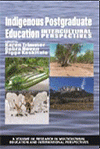
Indigenous Postgraduate Education
Intercultural Perspectives
Edited by:
Karen Trimmer, University of Southern Queensland
Debra Hoven, Athabasca University
Pigga Keskitalo, University of Lapland
A volume in the series: Research in Multicultural Education and International Perspectives. Editor(s): Fred Dervin, University of Helsinki, Finland. Zehavit Gross, Bar Ilan University.
Published 2020
This book focuses on Indigenous participation in postgraduate education. The collaborating editors, from the contexts of Australian, Canadian and Nordic postgraduate education, have brought together voices of Indigenous postgraduate students and researchers about strategies to support postgraduate education for Indigenous students globally and to promote sustainable solution-focused and change-focused strategies to support Indigenous postgraduate students. The role of higher education institutions in meeting the needs of Indigenous students is considered by contributing scholars, including issues related to postgraduate education pedagogies, flexible learning and technologies. On a more fundamental level the book provides a valuable resource by giving voice to Indigenous postgraduate students themselves who share directly the stories of their experience, their inspirations and difficulties in undertaking postgraduate study. This component of the book gives precedence to the issues most relevant and important to students themselves for consideration by universities and researchers. Bringing the topic and the voices of Indigenous students clearly into the public domain provides a catalyst for discussion of the issues and potential strategies to assist future Indigenous postgraduate students.
This book will assist higher education providers to develop understanding of how Indigenous postgraduate students and researchers negotiate research cultures and agendas that permeate higher education from the past to ensure the experience of postgraduate students is both rich in regard to data to be collected and culturally safe in approach; what connections, gaps and contradictions occur at the intersections between past models of postgraduate study and emerging theories around intercultural perspectives, including the impact of cultural and linguistic differences on Indigenous students' learning experiences; how Indigenous students’ and researchers’ personal and professional understandings, beliefs and experiences about what typifies knowledge and research or adds value to postgraduate studies are constructed, shared or challenged; and how higher education institutions manage the potential challenges and risks of developing pedagogies to ensure that they give voice and power to Indigenous postgraduate students.
CONTENTS
Foreword, Kaye Price. Acknowledgements. List of Contributors. SECTION I: THEORETICAL PERSPECTIVES. Indigenous Postgraduate Education, Karen Trimmer, Debra Hoven, and Pigga Keskitalo. Sa mi Education Challenges in a New Era, Pigga Keskitalo. Respect and Challenge: Relational Leadership Through Indigenous Research Postgraduate Supervision, Michelle M Evans, Annette Gainsford, and Reece George. Articulating My Own Black History: Success and Inhibiting Factors in an Aboriginal Student’s Pathway from Undergraduate to Postgraduate Study, Graham Akhurst and Katelyn Barney. Thinking from Another Perspective in an Intercultural Bilingual Teacher Education Program, Tuija Veintie and Gunilla Holm. From the Village to a University: A Native in a Context and Brazilian Indigenous Postgraduate Education, Francisco Apurinã and Pirjo Kristiina Virtanen. Indigenizing the Higher Degree Research Space: Ampere tyerrtye-areye apurte-irrentye akngerre. Tyerrty-arey-ae antartaremele mwarre anetyeke, (A Place Where People Come Together and Look After Each Other), Catherine Manathunga, Tracey Bunda, Michael Singh, and Jing Qi. Indigeneity in the Supervisor-Graduate Student Academic Journey, Jacqueline Ottmann and Dustin Louie. We Speak: Indigenous Voices Redefine the Doctoral Experience, Tracey Bunda, Kathryn Gilbey, Robyn Heckenberg, Raelene Ward, and Aue te Ava. A Formula for Expanding Consciousness: Reflections on the Story of an Anishinaabeg Man, Andrew Judge. SECTION II: VOICES OF INDIGENOUS POSTGRADUATE STUDENTS. Indigenous Postgraduate Education: An Aboriginal and Torres Strait Islander Standpoint, Michael Adams. Becoming a Sa mi Scholar: Narrating Sa mi Education Researcher’s Path, Pigga Keskitalo. The Research Higher Degree Journey for Aboriginal Students, Odette Best, Raelene Ward, Elizabeth Johnston, and Caitlin Easton. My Journey into the Sa mi Storytelling Tradition, Hanna Helander. The Relationships and Connections Behind Three Stories: Aboriginal Students in Higher Degree Research, Nyssa Murray, Ashleigh Johnstone, Anthony McKnight, Sheelagh Daniels-Mayes, Sam McMahon, and Valerie Harwood. The Space Between Belonging, Terralyn McKee. I Am a Part of Creation: An Anishinaabe Graduate Student. Reflection, Kimberley Debassige. Academia and Higher Education: Building Capacity for Indigenous Peoples, Kajsa Kemi Gjerpe. Salt Water and Self-Discovery: My Journey, Linda Wondunna-Foley. The Voice from Sa mi: Narrative Pathway in Critical Indigenous Educational Research, Erika Katjaana Sarivaara. Never Give Up: Language Matters, Mere Kepa. My PhD Story: A Lifelong Story of Coincidences, Torkel Rasmussen. Afterword: Intercultural Research Must Be Political, Fred Dervin and Ning Chen.
-
Paperback978-1-64802-109-1
Web price: $45.04 (Reg. 52.99)
-
Hardcover978-1-64802-110-7
Web price: $80.74 (Reg. 94.99)
- eBook978-1-64802-111-4

- EDU020000 - EDUCATION: Multicultural Education
- EDU015000 - EDUCATION: Higher
- EDU054000 - EDUCATION: Urban
-
 Culture, Motivation and Learning
A Multicultural Perspective
Culture, Motivation and Learning
A Multicultural Perspective
-
 Democracy and Multicultural Education
Democracy and Multicultural Education
-
 From Sites of Occupation to Symbols of Multiculturalism
Re-Conceptualizing Minority Education in Post-Soviet Latvia
From Sites of Occupation to Symbols of Multiculturalism
Re-Conceptualizing Minority Education in Post-Soviet Latvia
-
 Growing Up Between Two Cultures
Issues and problems of Muslim children
Growing Up Between Two Cultures
Issues and problems of Muslim children
-
 Religion in Multicultural Education
Religion in Multicultural Education
-
 Silent Partners in Multicultural Education
Silent Partners in Multicultural Education
-
 What the West Can Learn From the East
Asian Perspectives on the Psychology of Learning and Motivation
What the West Can Learn From the East
Asian Perspectives on the Psychology of Learning and Motivation

